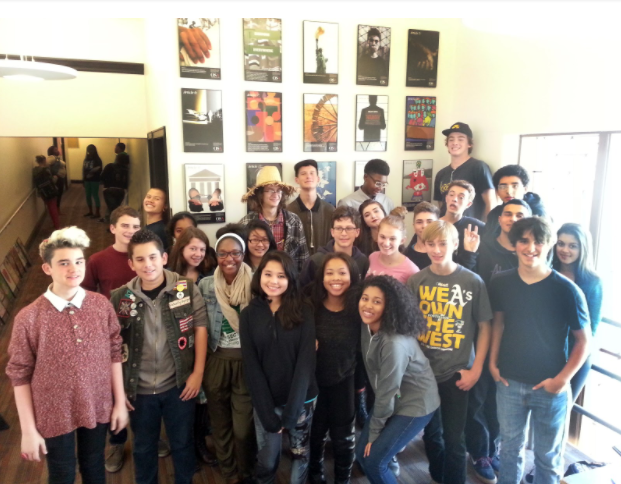The Charter renewal process should be straightforward, however, this year the Oakland Unified School District has put up certain obstacles making it more complex. The issue is that OUSD feels that the OSA audition process is illegal. This leaves our school with three options. - Nat salop
A charter school is a school that receives government funding while being run independently from the school district in which it is situated. In order to receive that money, the school receives a charter, which is defined by the Oxford English Dictionary as a “written grant by a country's legislative or sovereign power, by which a body such as a company, college, or city is founded and its rights and privileges defined”. California charters only last about five years, so that means every five years the administration has to reapply. OSA’s current license will expire at the end of the 2019-20 school year.
The process should be straightforward, however, this year the Oakland Unified School District has put up certain obstacles preventing that from happening. The issue is that OUSD feels that the OSA audition process should not be allowed, seeing as there is no alternative option for students to attend if they cannot get in to OSA. This leaves our school with three options.
The first option is that OSA can submit its charter application to OUSD with the audition still in place. In that case, OUSD can decide to deny the charter. OSA will then need to appeal this denial to the Alameda County Board of Education and apply to become a County Charter School instead of a District Charter School. If they agree with OUSD and OSA does not receive a charter, we will not legally be allowed to be a school. If they disagree with OUSD our charter with audition will be approved and OSA will become an Alameda County Charter School instead of an Oakland Unified District Charter School. This is a good option because our school is based on the charter, but we could end up using energy that could be put to students in fighting for the school, and worse case scenario OSA will have to close.
The second option is that OSA can submit the charter application to OUSD with entry into OSA only by lottery and no audition to get a lottery number. OSA would then allow any student to enroll if their number is selected from the lottery. However, this could be detrimental because it could lower the artistic standards and dedication of students enrolling.
The third and final option is to cease being a charter school and simply join OUSD, and in that case they would let us keep auditions. Any student who did not get in to OSA would be able to get into another district school. However, this option comes with a lot of uncertainties, especially regarding the teachers and campus. OSA could lose a lot of what makes it special, and become a generic district school. Additionally, many students commute in from other cities to attend OSA, and we may lose access to teaching those students.
“There is a strong purpose of our auditions, there's a reason why 92% of our community say that's important,” says Interim Principal Mike Oz, who would choose either the first or second option. “But what do auditions accomplish and is there a way to do that without them? We need to remain accessible, and equitable; and make sure we’re serving kids, that there's no barrier to get into the school, while also fulfilling the artistic mission of the school which is looking for kids that seek artistic excellence and not just artistic enrichment.”
One main issue that OUSD cites when questioning auditions is diversity, and whether the audition process prevents that. However, according to Mr. Oz, “going away from auditions would decrease diversity, because right now built into our audition process are support structures to bring in diversity, so if we go straight into a lottery with the changing demographics of Oakland it is entirely possible that we actually see a decrease.”
What Oz is referencing is that built into auditions are extra measures to ensure that a diverse group of students enter OSA each year. With the rapid gentrification of Oakland neighborhoods, a lottery system could create a more generic student body, one that does not accurately reflect the Bay Area.
“There is a strong purpose of our auditions, there's a reason why 92% of our community say that's important,” says Interim Principal Mike Oz, who would choose either the first or second option. “But what do auditions accomplish and is there a way to do that without them? We need to remain accessible, and equitable; and make sure we’re serving kids, that there's no barrier to get into the school, while also fulfilling the artistic mission of the school which is looking for kids that seek artistic excellence and not just artistic enrichment.”
One main issue that OUSD cites when questioning auditions is diversity, and whether the audition process prevents that. However, according to Mr. Oz, “going away from auditions would decrease diversity, because right now built into our audition process are support structures to bring in diversity, so if we go straight into a lottery with the changing demographics of Oakland it is entirely possible that we actually see a decrease.”
What Oz is referencing is that built into auditions are extra measures to ensure that a diverse group of students enter OSA each year. With the rapid gentrification of Oakland neighborhoods, a lottery system could create a more generic student body, one that does not accurately reflect the Bay Area.
No matter the outcome of the charter issue, it is important that the OSA community stay connected with one another and their mission. As Mr. Oz stated, “ [we should be] making sure that no matter where we land the conversation stays consistent, that we want accessibility and equity and that were serving kids that don't have access to an arts education otherwise.”
And most importantly, parents and students need to stay informed. The OSA community needs to be aware of what is happening in our school and our society, because it is vital that we find a way to speak up. As Interim Principal Oz said, “We live in a time where people need to be informed, because changes happen and if you’re not informed they happen without your knowledge, and by the time the change is done all of a sudden you're realizing how it impacts you. We need to be standing together on what the goal is but being willing to disagree on how to get there; I worry about when everybody tries to think identically because then were not thinking critically. We should be willing to disagree, and sit in a group, and have different ways of moving towards it; if we’re not in disagreement were not going to be moving through and problem solving in a healthy way.”
As of September 30, the OSA community has chosen to go ahead with renewing the charter without an audition, which would make sixth grade a year to explore all arts and choose which one the student wanted to pursue. High school students would audition for their arts after being accepted into OSA.




